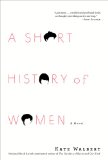
A Novel
by Kate Walbert
National Book Award finalist Kate Walbert's A Short History of Women is a profoundly moving portrayal of the complicated legacies of mothers and daughters, chronicling five generations of women from the close of the nineteenth century through the early years of the twenty-first.
The novel opens in England in 1914 at the deathbed of Dorothy Townsend, a suffragette who starves herself for the cause. Her choice echoes in the stories of her descendants interwoven throughout: a brilliant daughter who tries to escape the burden of her mother's infamy by immigrating to America just after World War I to begin a career in science; a niece who chooses a conventional path—marriage, children, suburban domesticity—only to find herself disillusioned with her husband of fifty years and engaged in heartbreaking and futile antiwar protests; a great-granddaughter who wryly articulates the free-floating anxiety of the times while getting drunk on a children's playdate in post-9/11 Manhattan. In a kaleidoscope of voices and with a richness of imagery, emotion, and wit, Walbert portrays the ways in which successive generations of women have responded to what the Victorians called 'The Woman Question.'
As she did in her critically acclaimed The Gardens of Kyoto and Our Kind, Walbert induces “a state in which the past seems to hang effortlessly amid the present” (The New York Times). A Short History of Women is her most ambitious novel, a thought-provoking and vividly original narrative that crisscrosses a century to reflect the tides of time and the ways in which the lives of our great-grandmothers resonate in our own.
"Starred Review. Walbert's look at the 20th century and the Townsend family is perfectly calibrated, intricately structured and gripping from page one." - Publishers Weekly
"Starred Review. With a sharp eye and deft touch, Walbert explores the ways women's priorities and freedoms have evolved even as their yearnings have stayed remarkably constant." - Booklist
"It's gripping, intense, and powerful. Walbert's language is elegant, her images resonant. ... Highly recommended for all contemporary fiction collections." - Library Journal
This information about A Short History of Women was first featured
in "The BookBrowse Review" - BookBrowse's membership magazine, and in our weekly "Publishing This Week" newsletter. Publication information is for the USA, and (unless stated otherwise) represents the first print edition. The reviews are necessarily limited to those that were available to us ahead of publication. If you are the publisher or author and feel that they do not properly reflect the range of media opinion now available, send us a message with the mainstream reviews that you would like to see added.
Any "Author Information" displayed below reflects the author's biography at the time this particular book was published.
Kate Walbert was born in New York City and raised in Georgia, Texas, Japan and Pennsylvania, among other places. She is the author of the novels The Sunken Cathedral, among the San Francisco Chronicle's best books of 2015; A Short History of Women, chosen by The New York Times Book Review as one of the ten best books of 2009 and a finalist for the LA Times Book Prize; Our Kind, a finalist for the National Book Award, and The Gardens of Kyoto, as well as the linked stories, Where She Went. She's received a National Endowment for the Arts fiction fellowship, a Connecticut Commission on the Arts fiction fellowship, and a Dorothy and Lewis B. Cullman Fellowship at the New York Public Library, and her stories has been published in The New Yorker, The Paris Review, The Best...
... Full Biography
Author Interview
Link to Kate Walbert's Website
Your guide toexceptional books
BookBrowse seeks out and recommends the best in contemporary fiction and nonfiction—books that not only engage and entertain but also deepen our understanding of ourselves and the world around us.